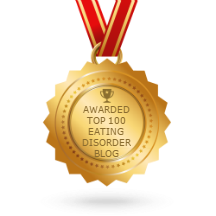- Home
- About
-
Services
- Therapy
-
Eating Disorder Trainings
>
- Clinical Approaches To Treating Body Image Issues
- Clinical Approaches To Treating Bulimia & Binge Eating Disorder
- Finding Freedom From Binge Eating
- Finding Freedom From Anorexia
- Supporting A Loved One With An Eating Disorder
- Eating Disorder Recovery Road Map
- Healing From Body Hate And Practicing Self-Compassion
- Common Questions
- Blog
- Press
- Contact
|
Around the New Year we are inundated with diet-culture messages that emphasize a focus on “fixing yourself.” Each New Year many people resolve to “lose weight,” and “get healthier.” There seems to be an increased focus on joining the gym, dieting, and “lifestyle changes” (aka diets in disguise).
For individuals in recovery from an eating disorder, the New Year can be a particularly challenging time. With everyone around you racing to join the nearest gym and obsessing about their new “clean eating plan,” it may be difficult to maintain focus on recovery and body kindness. The following are three quick tips for navigating the New Year and staying on track in your eating disorder recovery. 1. Do a social media detox. Food related “detoxes” are a ridiculous waste of time and money. There is simply no scientific evidence to support the need for a “detox." If you’ve got a functioning liver and kidneys, they are already doing this job for you. However, there is one kind of detox that I support, which is a social media and diet-culture detox. Essentially, the first step is to go into your social media and unfollow or unfriend anyone that causes you to feel badly about yourself. Make sure that you remove any social media accounts that talk about weight loss, changing your body, dieting, “lifestyle changes,” and promote an unhealthy fixation with food and exercise. Next, you can go ahead and add in some body-positive, health at every size, and eating disorder recovery accounts. While you cannot effectively remove all aspects of diet-culture from your life, you can work to make your social media feed pro-recovery and body-positive. It can also be helpful to follow people who promote body-diversity and demonstrate that you CAN be healthy and happy at any size. 2. Set some pro-recovery, body-positive, and self-compassion related goals. I’ll be honest in that I’m not really into the idea of New Year’s resolutions. First off, here’s simply not a lot of data to support that people actually stick to their resolutions. Additionally, I think that it’s helpful to utilize goal setting throughout the year. The New Year is a fresh start and a time to really think about your priorities and values. It can be helpful to use this time to set some goals that support your recovery. However, rather than setting goals for the whole year, I think that it can be more useful to set them for the next month or so. This feels less overwhelming to some people and can make it easier to stick to the intentions that you have set for yourself. Some ideas for pro-recovery goals to set could include challenging yourself to certain “fear foods,” working on practicing body-appreciation, and developing a more compassionate approach to yourself through your self-talk and self-care. 3. Reach out to your support system if you start to feel triggered. It’s important to practice self-compassion if you start to feel triggered around the New Year. Eating disorder recovery is tough, especially when everyone around you is racing to join the nearest gym and ranting about their new “diet” plan. However, with time and practice you can learn how to effectively manage your triggers and use healthy coping strategies. If you are starting to feel triggered to return to disordered behaviors, it’s crucial to reach out to members of your support network, which could include family, friends, and your treatment team. Eating disorders thrive on shame and secrecy, thus it is important to be open with the people in your life about what you are experiencing. No one should have to struggle alone and you deserve to have some support. The Bottom Line The New Year is an exciting fresh start and a great opportunity to refocus on your values and priorities. However, it can also be a triggering time for those in recovery from an eating disorder. Work to practice compassion for those who are still stuck in body-hatred and the diet cycle. When they say that they want to “lose weight,” often this is simply masking their true aim, which is to feel loved, accepted, and joyful. Remind yourself that your worth is not found in your weight, eating habits, or your body. Additionally, people of all shapes and sizes are worthy of love and belonging. If you must make a resolution this New Year, the following are some things that you can work to lose (instead of weight).
You are enough, just as you are. Jennifer Rollin, MSW, LCSW-C: has a private practice providing therapy in Rockville, Maryland, for adolescents and adults struggling with eating disorders, body image issues, anxiety, and survivors of trauma. Jennifer offers eating disorder recovery coaching via phone/Skype. Connect with Jennifer through her website at www.jenniferrollin.com
0 Comments
Leave a Reply. |
About MeI'm an eating disorder therapist in private practice in Rockville, MD. Archives
June 2024
|


 RSS Feed
RSS Feed
